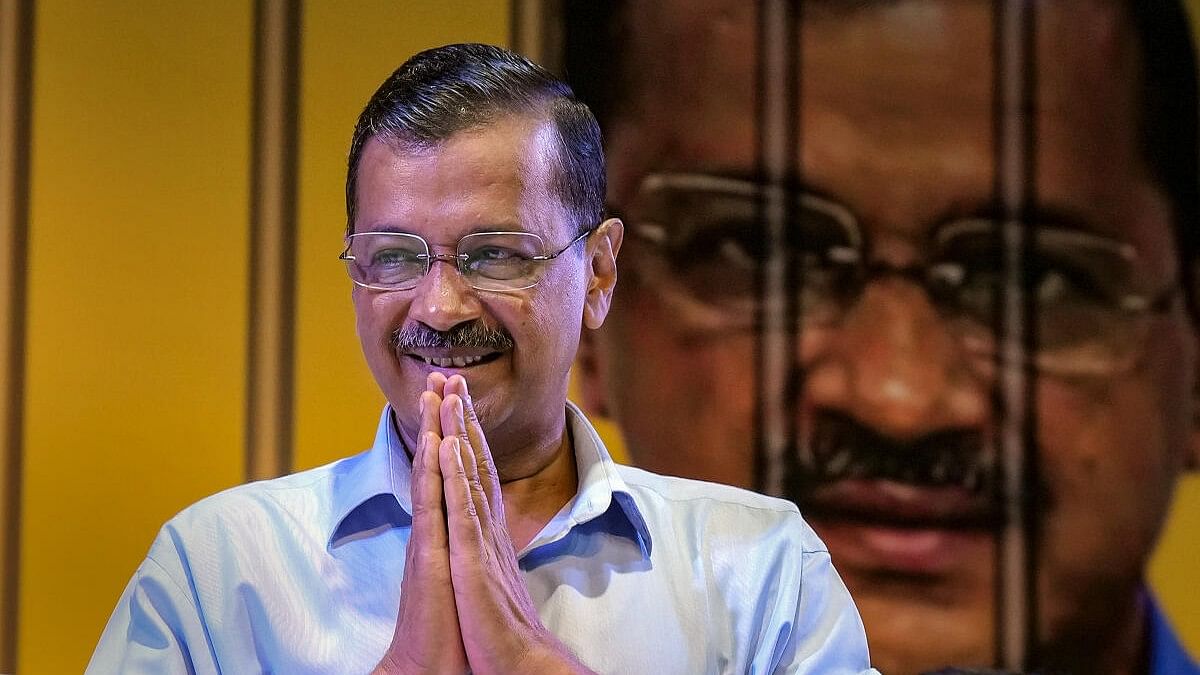
Delhi Chief Minister Arvind Kejriwal.
Credit: PTI File Photo
New Delhi: The Supreme Court on Friday granted bail to Delhi Chief Minister Arvind Kejriwal in the CBI's case registered in connection with the liquor policy scam, as one judge found no procedural infirmity in his arrest and another judge termed it as unjustified.
A bench of Justices Surya Kant and Ujjal Bhuyan allowed his appeal against the Delhi High Court's judgment of August 5, denying him the bail. The court upheld the High Court's order dismissing Kejriwal's writ petition against his arrest. Justice Bhuyan, however, gave separate reasonings.
Justice Kant said Kejriwal’s arrest on June 26 did not suffer from procedural infirmity but “prolonged incarceration of an accused person pending trial amounts to unjust deprivation of personal liberty”.
Justice Bhuyan, however, felt that Kejriwal's belated arrest by the CBI is unjustified and his continued incarceration in the case that followed such arrest has become untenable.
"The CBI must not only be above board but must also be seen to be so. It should dispel the notion that the agency is a caged parrot," he said.
He said the deprivation of liberty even for a single day is too much, when Kejriwal has been granted bail in stringent provisions of the Enforcement Directorate case.
“Bail jurisprudence is a facet of the civilised criminal justice system. An accused is innocent until proven guilty. This court has been reiterating time and again, the salutary principle that bail is the rule and jail is the exception. Courts at all levels must ensure the process leading to and including the trial does not become punishment itself,” Justice Bhuyan noted.
The court granted the relief to Kejriwal on a bail bond of Rs 10 lakh, and two sureties of the equal amount.
The two judges agreed on granting bail to Kejriwal but authored separate judgments. Justice Kant dismissed Kejriwal's appeal against the High Court's order, challenging the legality of his arrest. Justice Bhuyan, on his part, clarified the High Court's judgment by his reasonings.
Justice Kant wrote, “The basic principle is reiterated that the evolution of bail jurisprudence in the country underscores that issue of bail is liberty, justice. Developed jurisprudence of bail is integral to a society sensitized to the judicial process. The prolonged incarceration of an accused person pending trial amounts to unjust deprivation of personal liberty”.
The bench observed that the legislative policy of granting bail will meltdown where there is no likelihood of trial being completed in a reasonable time.
“The courts invariably bent towards liberty with a flexible approach towards an undertrial, save and except when the release of such a person is likely to shatter societal aspirations, derail the trial, or deface the very criminal justice system, which is integral to rule of law," Justice Kant said.
Justice Kant said the FIR was registered on August 17, 2022, and since then a charge sheet and four supplementary charge sheets have been filed, and the fourth supplementary charge sheet was filed on July 29, 2024.
He noted additionally, 17 accused persons have been named, 224 individuals have been identified as witnesses, and documents both physical and digital have been submitted. Justice Kant said these factors suggested that completion of the trial is unlikely to occur in the immediate future.
The bench did not accept CBI’s contention regarding the tampering of the evidence and influencing the witnesses, if Kejriwal were to be released on bail.
“The appellant has satisfied the requisite triple condition for the grant of bail,” Justice Kant said.
Justice Kant found no impediment in arresting a person already in custody. "We have noted that CBI in their application recorded reasons as to why they deemed it necessary. There is no violation of Section 41A (3) of the Code of Criminal Procedure," Justice Kant said.
In its order, the court clarified Kejriwal will not make any public comments on the merits of the CBI’s case, as the matter is subjudice before the trial court and this condition is necessary to dissuade a recent tendency of building up a self-serving narrative on public platforms.
The court said the terms and conditions imposed by the co-ordinate bench, which includes that CM cannot visit his office and also cannot sign files, in the Enforcement Directorate’s matter shall apply in this case also.
"Though I have serious reservations on clauses which debars the appellant from entering the office of Chief Minister and the Delhi Secretariat as well as from signing files, having regard to judicial discipline, I would refrain from further expressing my views at this stage since those conditions have been imposed in the separate ED case by a two judge bench of this court," Justice Bhuyan wrote.
On July 12, a separate bench granted interim bail to Kejriwal as it referred to questions arising out of his challenge to arrest in a money laundering case, for consideration before a larger bench.
